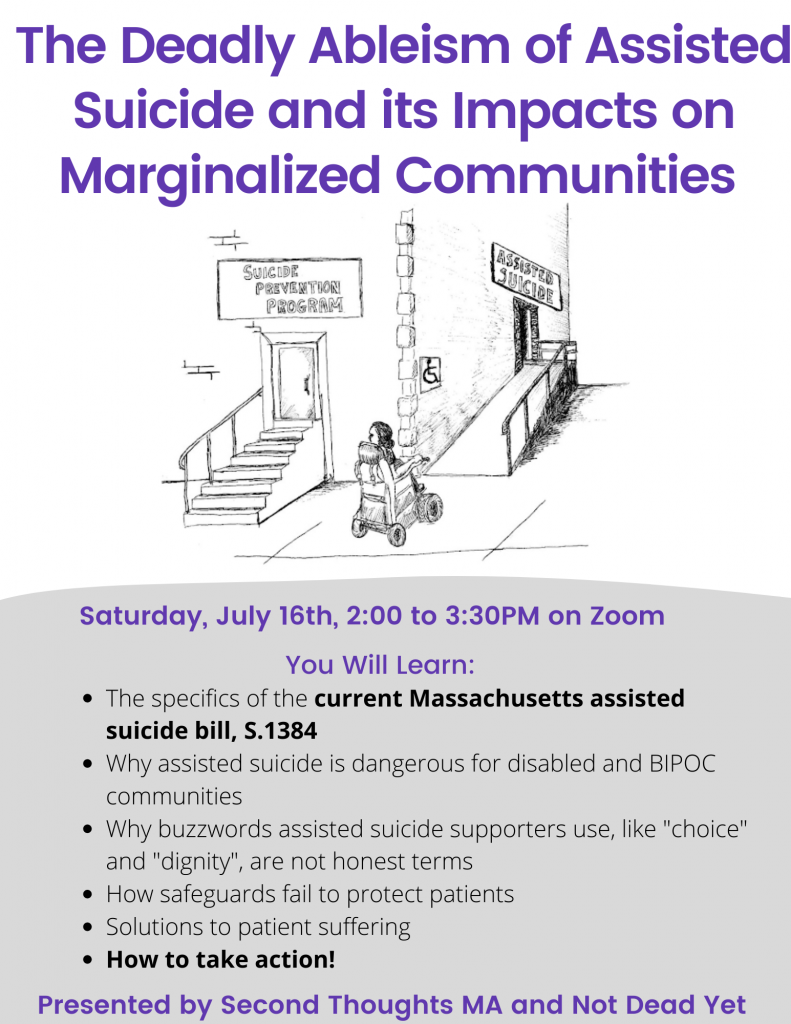by John Kelly:
Proponents of assisted suicide laws have insisted for years that assisted suicide has nothing to do with disability, when a glance at the reported “end of life concerns” in Oregon showed those concerns to be all about people’s psychological distress over the disabling aspects of their serious disease.
As one example, lead Massachusetts proponent of the assisted suicide ballot question in 2012, Dr. Marcia Angell, told radio station WBUR that “This has nothing to do with disabled people, nothing whatsoever… It’s fine for them to take whatever position they want to. But they have no special standing.”
On September 30, Director of Second Thoughts MA John B. Kelly engaged in a two-hour debate on assisted suicide with Thaddeus Pope, the Director of the Health Law Institute at the Mitchell Hamline School of Law. During a segment discussing a question from a Massachusetts disabled man who would want to use assisted suicide because of feelings around incontinence, Pope and Kelly had the following exchange.
Referring to the Oregon reports, Kelly said that assisted suicide laws are “all about disability. All the reasons are about disability.” Pope replied, “Well, I mean, they are. I mean, that’s worth conceding, I think.… So everybody who’s using medical aid in dying is disabled. And probably you could go to the next step and say the reason they want medical aid in dying is because of their disability.”
He concludes that “I guess the key thing is that’s their judgment, right? Some people would say, ‘I find this condition intolerable.’ Other people won’t.”
Kudos to Thaddeus Pope for his honesty!
Now if other proponents can be equally as honest, we can have out in the open the outrage of declaring some people are “better dead than disabled.”
Second Thoughts MA and the national disability rights group Not Dead Yet argue that disabled people deserve equal protection under the law regarding suicide prevention services.
The transcript of the video clip follows.
Thaddeus Pope: It’s a framing question. Is the State of Massachusetts thwarting, is it getting in the way or is it facilitating? All he wants is for the State of Massachusetts to get out of the way. He’s not asking for affirmative support or anything like that. He just says, just decriminalize it. Because as of now, the state government of Massachusetts has inserted itself between him, this questioner, and his physician. And all he wants is for the state to get out of the way. John Kelly: I would say that, you’ve turned that on its head. The state gets involved by approving of the person’s reasons for wanting to die, and giving the doctor immunity by prescribing this. Now, if someone wanted to die because they felt that extraterrestrial beings were assaulting them and trying to kill them, well, they probably wouldn’t be seen as rational. But as long as the formulation that it’s rational for a person to feel lack of dignity over incontinence, then we are instituting massive prejudice against people who live with those conditions. That seems self-evident to me and I don’t understand how people can say, “oh, it has nothing to do with disabled people.” When it’s all about disability. All the reasons are about disability.
Moderator Lisa Schiltz: Thaddeus.
Thaddeus Pope: Well, I mean, they are. I mean, that’s worth conceding, I think. I mean his diagram, the two Venn diagrams, everybody who’s terminally ill probably is definitionally disabled. So if you have metastatic terminal cancer, you’re disabled. So everybody who’s using medical aid in dying is disabled. And probably you could go to the next step and say the reason they want medical aid in dying is because of their disability. It’s because of the cancer or the side effects or the conditions from the cancer. So that’s a true statement, but I guess the key thing is that’s their judgment, right? Some people would say, “I find this condition intolerable.” Other people won’t.



